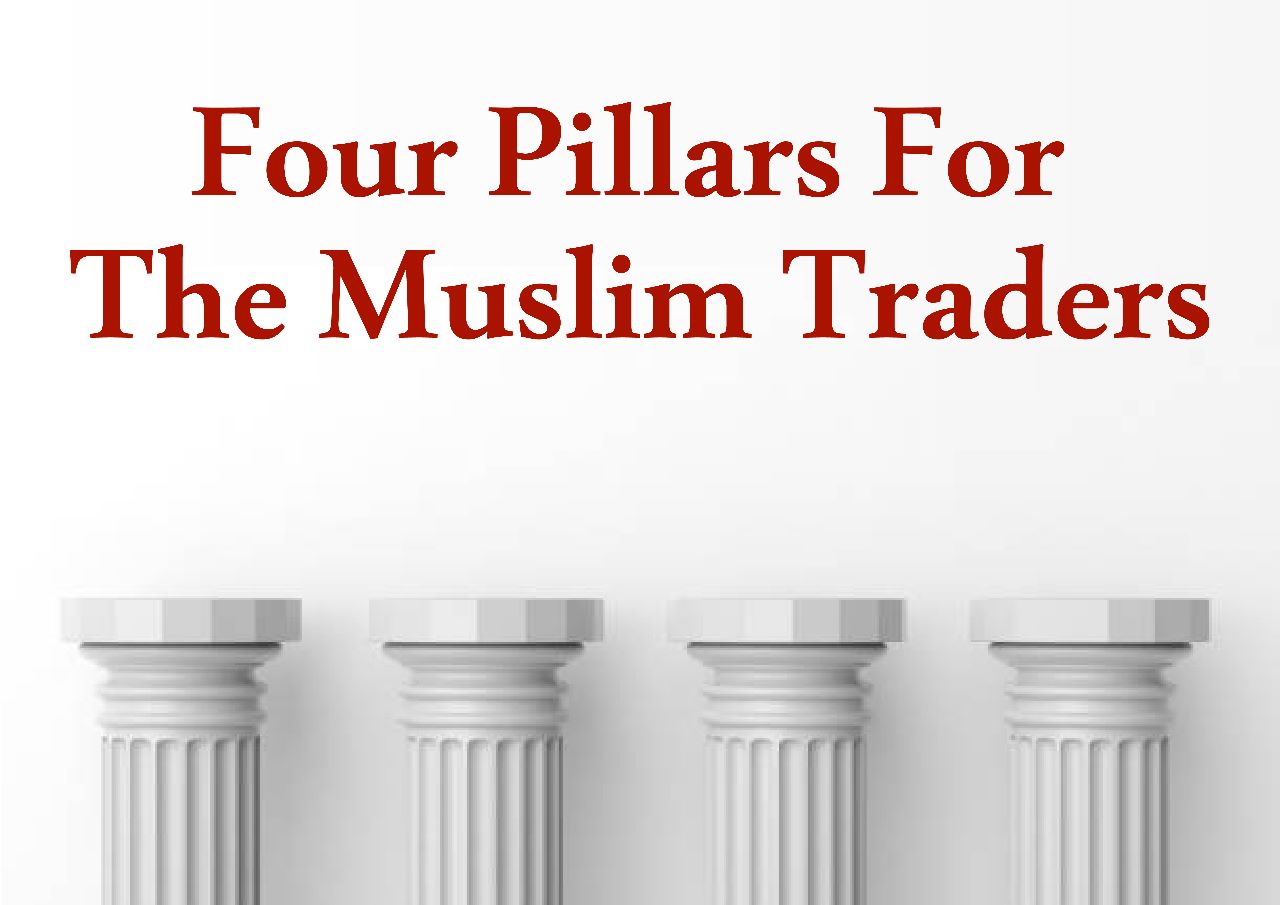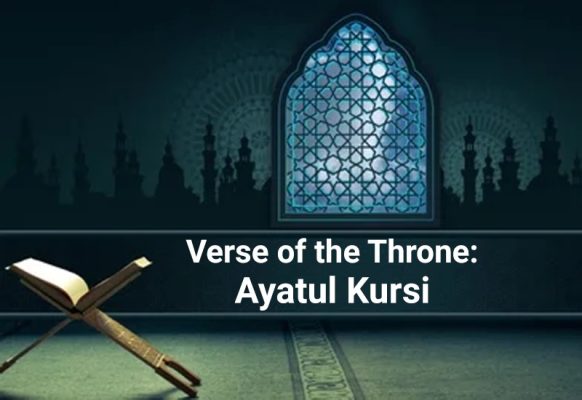Imām Aḥmad narrated in his Musnad (6652) from the Ḥadīth of ‘Abd Allah ibn ‘Amr that Allah’s Messenger ﷺ said (in meaning): “Four (qualities); if they are within you, then nothing is upon you about what you missed in the world: preservation of trust, truthfulness in speech, goodness in manners and abstinence in food”. This is a mighty Ḥadīth, worthwhile for every Muslim trader to reflect and keep his eyes upon. Rather, it should be circulated between the traders, trading stores and companies until it rectifies those engaged in trading; (including) their path and methodology in buying, selling and dealings. That is so that these four matters become firm foundations in him, he does not compromise in them however the profit is. In this Ḥadīth, there is a wise and tremendous treatment for the immense corruption that occurs to the morals of people when devoting to this world with its debris, (as well as) trading, earning wealth and seeking profits. And that there is no safety from that except that the trader preserves upon these four foundations mentioned in the Ḥadīth, is keen on not to fall short on any of them and makes them pillars he resorts to, not accepting them to be lost. Also, he does not mind if something escapes him from this world in the path of his preservation upon these pillars even if there were in front of him big earnings and many profits, for these should not destroy anything from the foundations. He is always observing the saying of the Prophet ﷺ: “…then nothing is upon you about what you missed in the world…;” so he is not concerned about what misses him from the world in the path of his preservation and his sticking to these great and excellent characteristics mentioned in the Ḥadīth. And man is severely tested in these four matters when he enters the field of trading. So sometimes, he is offered large profits (being) very temping, but it requires from him that he lies or cheats or something similar. Thus, he enters in a dispute with himself: Does he obtain the profit through the likes of these pathways? Or he says as the Ḥadīth has indicated: “Nothing is upon me about what missed me from the world and these foundations must remain”? even if it was clear in the matter that he will not profit and that he will lose the deal or trade, or he will miss something from the profits or earnings for Allah, glorified and sublime be He, will replace it with something better as provisions and bounties are in His Hand, glorified and sublime be He. Hence, the statement of the Prophet ﷺ: “…then nothing is upon you about what you missed in the world…” counts as a guarantee for the trader, i.e. do not despair over what missed you from the profits even if they are a lot, and do not be sad for you are in goodness and benefit even if you missed this wealth, and you have a blessed compensation from Allah. And this is why it is important for everyone who steps into a trade to be cautious to these four great foundations and that they become firm within him.
First: Preservation of trust, i.e., he is trustworthy in his dealings; he does not cheat, deceive nor plot (something bad). (Rather,) he is trustworthy in preserving the rights of people and in returning their wealth. So he does not lose the rights of the people, rather, he safeguards (them) for the responsibility of their rights. And a person is surely afflicted and tested when he enters the door of trading; does he preserve the responsibilities? Or wastes them in the path of obtaining wealth or obtaining something from the remnants of the world? Many people fall in this test and wastes the responsibility in the path of earning wealth or a possession from the possessions of this world and its temporary enjoyment. And from the people is he who deals sincerely in restricted limits and in limited goals, so he deals with trust in the limits of those who deal with him likewise, as a reward for him from the kind of work he did. So if he finds a trustworthy person, he treats him with trust. And if he finds a traitor, he treats him with treachery; this is not the affair of a believer. In the Musnad (15424) and others with Ṣaḥīḥ Isnād from Anas ibn Mālik, may Allah be pleased with him, that the Prophet ﷺ said:
“Fulfil the trust for the one who entrusted you, and do not cheat the one who cheated you.” So trust is required at all times and circumstances, and it is praiseworthy in all conditions while treachery is reprehensible and bad in all circumstances. And this is why he ﷺ said: “…and do not cheat the one who cheated you.” Yes, ask him for your rights but do not deal with him in treachery for treachery is reprehensible at all times.
Second: Truthfulness in speech, i.e., he does not lie, rather, he preserves upon sincerity. And when he talks to the people in his buying and selling, he is always truthful. When he says to them “these goods are new” then he is truthful in his speech. When he says “this kind is authentic” he is truthful in his speech. When he says “this is from today not yesterday” he is truthful in his speech. And he says to himself “And what will benefit me if I earn from this one riyal and from that two riyals or ten or a thousand or more while I have lost the character of honesty and I became a liar?” The Prophet ﷺ said:
“Beware of lying for indeed lying leads to wickedness and indeed wickedness leads to the hellfire”
[al-Bukhārī 6094 & Muslim 2607]
The person believes that the provisions are in the Hand of Allah, glorified and sublime be He, and not by the Riyals or Dirhams by which one loses the character of sincerity in him as sincerity is a firm root and a foundation he does not compromise in nor loses it. While we have some people, their manners become corrupt with the practice of selling and being keen on this world and earnings. So he is afflicted with certain deals wherein he finds himself carried away to lie, rather, he may swear heavy oaths. The Prophet ﷺ said:
“Three (people); Allah will not speak to them on the day of resurrection nor look at them nor purify them and they have a painful punishment…(and he mentioned from them)…and the seller of goods by a false oath
[Muslim 106]
So he sells the sincerity and becomes a liar for the purpose of earning something from the world and its temporary enjoyment -and to Allah belongs refuge-.
Third: Goodness in manners, i.e., he deals the people with good manners and esteemed morals. And the one engaged in trading, buying, and selling witnesses from the variety of manners of the people and differences in natures, rather, ill-treatment from them is something re-occurring. And constant contact with people in buying and selling and dealings affects the manners with a negative influence if this pillar is not preserved upon, the one clarified in the Ḥadīth “goodness in manners.” Then, the trader will be in a fight with himself for the preservation of his good manners, not that he sells his manners in the market by being in contact with bad-mannered people. Some people, because of their living with a variety of people and his need for buying and trading, they start cursing, taunting, abusing and become bad mannered. He earned this in his trade and his dealing with the people, so he lost this characteristic because of his breaking into trade and entering in it without any preservation upon this great pillar. And the Muslim trader, the sincere to himself, does not make the trade and his contact with people a reason for losing the manners. And what does a person profit when he obtains wealth and corrupts his morals?! And what benefit does his wealth give him if he loses his manners?!
Fourth: abstinence in food, i.e., that he abstains in his food and that is by keenness on obtaining the Ḥalāl and distancing from the Ḥarām and what is dubious. The Prophet ﷺ said:
“Indeed the Ḥalāl is clear and indeed the Ḥarām is clear. And between them are doubtful matters, many people do not know them. So whoever distances from the doubtful matters saves his religion and honour. And whoever indulges in the doubtful matters has indulged in the Ḥarām like a shepherd who grazes near the (private) vicinity soon to go in it. Indeed every king has a (private) vicinity and the (private) vicinity of Allah is what He prohibited”
[al-Bukhārī 52 & Muslim 1599] So he is keen on the purity of his food, i.e., the pure food which has no Ḥarām in it neither a blot of Ḥarām. So when the sale has Ribā (Usury), cheating, deception, or a prohibited form of sale in the Sharī’ah (legislation), he distances from it completely because from the firm principles in him is abstinence in food. He does not go extreme in it, but he searches for the profit with a search that does not fall short in this matter. While some people enter trade and the field of earning profits while he does not care about the issue of abstinence in food and he does not care about the wealth he earns, is it from Ḥalāl or from Ḥarām? Rather, some people’s principle in this is: “Ḥalāl is what is lawful in your hand and Ḥarām is what is prohibited from it” so whatever is lawful in his hand and became in his possession from any way, this is what is Ḥalāl. And Ḥarām is what his hand does not reach and does not attain it; he does not care about Ḥalāl or Ḥarām. The Prophet ﷺ said:
“Every meat grown out from Haram, the hellfire is more befitting for it ”
[Ḥilyat al-Awliyā 8/247]
And he ﷺ mentioned :
“The man prolonged in travel; his hair is dishevelled and dusty. He lifts his hand to the sky saying: O Rabb, O Rabb while his food is Ḥarām, his drink is Ḥarām, his dressing is Ḥarām and his nourishment is Ḥarām then how can his Du’ā be accepted?”
[Muslim 1015]
i.e., how can it be accepted from someone in this state?! And this is why some of the Salaf (righteous predecessors) said:
“Whoever would like for Allah to accept his Du’ā, then let him correct his provision”
[Jami’ al-‘ulūm wal Hikam 1/275]
So this is a chapter worthy for the Muslim trader to be concerned with in learning and understanding, thus he does not enter anything in himself from the food and drinks except after learning (about it). If it is pure (from Ḥarām) then he eats and drinks it, and if it is Ḥarām or dubious, he leaves it and distances from it because from the firm principles in him is: Pure provisions. He does not compromise in this matter, rather it is from the firm and grounded matters in him.
So preserve my brother, the Muslim trader, on these four pillars and do not miss anything from them. Also, be cautious from the Shayṭān and the soul inclined to evil; as it is said: “I entered the market with sincerity while my goods remained unsold and nothing is spent except the goods of the liars and cheaters around me, those that lie upon the people and say wallahi this is new! And they swear (thereby)”
Hence it is a place of test for the morals, it will not harm you whatever you missed from the world, an advice to you from your Prophet, upon him peace and praise. And you shall see that with your patience on the Sunnah and your preservation on the commandments of the honourable Prophet, upon him peace and praise. The praiseworthy outcome is for you in this world and the hereafter.
May Allah Ta’ala protect you -my honorable brother- from the evil manners, actions, and desires. May He provide you from the Ḥalāl wealth and a pleasant life. Indeed, He is the All-Hearing, the Answerer. Allah knows best and peace and praise be upon Allah’s worshipper and Messenger, our prophet Muhammad, and upon all his followers and companions.














